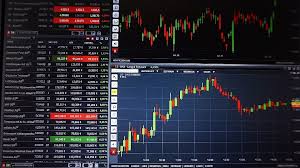Forex Trading for Dummies A Beginner’s Guide to the Forex Market 1825754750

Forex Trading for Dummies: A Beginner’s Guide to the Forex Market
Forex trading can seem daunting for beginners, but it doesn’t have to be. Understanding the basics is essential for anyone interested in navigating this dynamic financial market. In this article, we will cover the fundamentals of Forex trading and provide you with the knowledge you need to start your journey. One of the best resources to consider for a robust trading experience is forex trading for dummies Best Uzbek Brokers, which offers insights into reputable brokers in the industry.
What is Forex Trading?
Forex, also known as foreign exchange or FX, is the global marketplace for buying and selling currencies. It is one of the largest and most liquid financial markets in the world, with an average daily trading volume exceeding $6 trillion. Traders participate in Forex trading to profit from fluctuations in currency values against each other.
Key Concepts in Forex Trading
Before diving into trading, it is crucial to familiarize yourself with some key concepts:
- Currency Pairs: Forex trading involves trading currencies in pairs, such as EUR/USD (Euro/US Dollar) or GBP/JPY (British Pound/Japanese Yen). The first currency listed is the base currency, and the second is the quote currency.
- Pips: A pip (percentage in point) is the smallest price movement that a given exchange rate can make. For most currency pairs, a pip is typically the fourth decimal place (0.0001).
- Leverage: Forex trading often involves the use of leverage, which allows traders to control larger positions with a smaller amount of capital. While leverage can amplify profits, it also increases the risk of significant losses.
- Lot Sizes: In Forex, trades are typically executed in standardized units called lots. A standard lot is 100,000 units of the base currency, while a mini lot is 10,000 units, and a micro lot is 1,000 units.
Understanding How the Forex Market Works
The Forex market operates 24 hours a day, five days a week, allowing traders to participate at any time. The market is divided into major sessions: the Sydney session, Tokyo session, London session, and New York session. Each session presents different trading opportunities due to varying volatility and liquidity levels.
Getting Started with Forex Trading
Now that you’ve got a grasp of the basic concepts, here are some steps to get started with Forex trading:
- Choose a Reliable Forex Broker: Selecting a reputable broker is critical to a successful trading experience. Look for brokers that are regulated, offer a user-friendly platform, and provide good customer support.
- Open a Trading Account: Most brokers offer several types of accounts, including demo accounts for beginners. A demo account allows you to practice trading without risking real money.
- Fund Your Account: Once you are comfortable with the demo account, you can fund your live account. Be sure to start with an amount you can afford to lose.
- Develop a Trading Plan: A solid trading plan will outline your trading strategy, goals, risk management methods, and the currencies you plan to trade.
- Practice Risk Management: Successful Forex trading involves managing risk effectively. It is essential to set stop-loss orders and determine how much of your capital you are willing to risk on each trade.
Common Trading Strategies

Different traders use various strategies to approach the market. Here are a few common strategies:
- Day Trading: Day traders open and close positions within the same trading day, aiming to profit from short-term price movements.
- Swing Trading: Swing traders hold positions for several days or weeks to capture short to medium-term gains based on price swings.
- Scalping: Scalpers make multiple trades throughout the day, often holding positions for a few minutes to take advantage of small price movements.
The Importance of Analysis in Forex Trading
Successful forex traders regularly analyze market conditions and currency pairs. There are two primary types of analysis:
Fundamental Analysis
This approach involves evaluating economic indicators, news, and events that can affect currency prices, such as interest rate changes, employment reports, and geopolitical developments.
Technical Analysis
Technical analysis uses historical price data and chart patterns to forecast future price movements. Traders often rely on indicators and tools, such as moving averages, RSI (Relative Strength Index), and Fibonacci retracements.
Emotional Discipline and Psychology in Trading
One overlooked aspect of trading is the psychological component. Emotions such as fear and greed can significantly impact trading decisions. Developing emotional discipline is crucial for long-term success in Forex trading. Traders should stick to their trading plans and avoid making impulsive decisions based on emotion.
Conclusion
Forex trading offers incredible opportunities for those willing to learn and invest the time necessary to understand the market. Remember to start small, practice risk management, and continually educate yourself on market dynamics. With patience and discipline, you can develop a successful trading strategy and work towards achieving your financial goals. By delving into the world of Forex trading, you’re taking the first step towards maximizing your investment potential.
